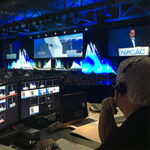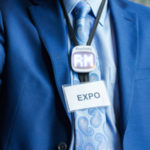Paleo-Future is full of old newspaper and magazine articles, advertisements, artwork, and other past media predicting how life would be lived in the years to come. And, amid the piles of things that never came to be — the flying cars and moon outposts and robot servants — are some things that kinda, sorta have, such as “laser-holography,” whose development was predicted in a 1979 book called Future Cities: Homes and Living Into the 21st Century.
On the left the heads of a branch office have just come in to their boardroom, first thing in the morning. Across their table is their boss. He is in the head office of the company in the centre of a major city thousands of miles away. … 3-D cameras hanging from the ceilings of each room create the illusion of a complete room with the two sides present…. Electronic conferences like this would save enormous amounts of time, money and energy.




